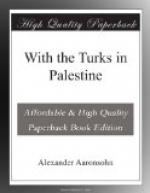As I proceeded on my journey northward, I hoped to find consolation and brighter prospects in the independent province of the Lebanon. Few Americans know just what the Lebanon is. From the repeated allusions in the Bible most people imagine it to be nothing but a mountain. The truth is that a beautiful province of about four thousand square miles bears that name. The population of the Lebanon consists of a Christian sect called Maronites and the Druses, the latter a people with a secret religion the esoteric teachings of which are known only to the initiated, and never divulged to outsiders. Both these peoples are sturdy, handsome folk. Through the machinations of the Turks, whose policy is always to “divide and rule,” the Maronites were continually fighting against the Druses. In 1860 Turkish troops joined with the Druses and fell upon the Maronites with wholesale massacres that spread as far south as Damascus, where ten thousand Christians were killed in two days.
[ILLUSTRATION: THE CHRISTIAN TOWN OF ZAHLEH IN THE LEBANON]
The European powers were moved at last. Fifty warships were sent to Beirut, and ten thousand French troops were landed in the Lebanon, to create order. Under the pressure of the European powers the Sublime Porte was forced to grant an autonomy for the province of the Lebanon. The French, English, German, Russian, Austrian, and, a year later, the Italian, Governments were signing the guaranty of this autonomy.
Since then the Lebanon has had peace. The Governor of the province must always be a Christian, but the General Council of the Lebanon includes representatives of all the different races and religions of the population. A wonderful development began with the liberation from Turkish oppression. Macadamized roads were built all over the province, agriculture was improved, and there was complete safety for life and property. There is a proverb now in Palestine and Syria which says, “In the Lebanon a virgin may travel alone at midnight and be safe, and a purse of gold dropped in the road at midday will never be stolen.” And the proverb told the literal truth.
When one crossed the boundary from Turkish Palestine into the Lebanon province, what a change met his eyes!—peaceful and prosperous villages, schools filled with children, immense plantations of mulberry trees and olives, the slopes of the mountains terraced with beautiful vineyards, a handsome and sturdy population, police on every road to help the stranger, and young girls and women with happy laugh and chatter working in the fields. With a population of about six hundred thousand this province exported annually two million dollars’ worth of raw silk, silkworm-raising being a specialty of the Lebanon.
When autonomy was granted the Lebanon, French influence became predominant among the Maronites and other Christians of the province. French is spoken by almost all of them, and love for France is a deep-rooted sentiment of the people. On the other hand, the Druses feel the English influence. For the last sixty years England has been the friend of the Druses, and they have not forgotten it.




